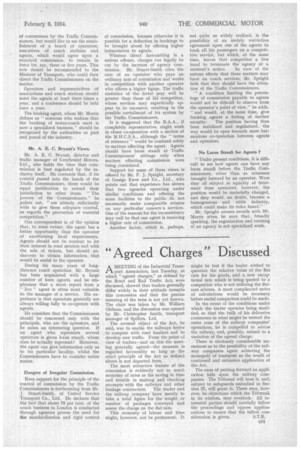"Agreed Charges" Discussed
Page 109

If you've noticed an error in this article please click here to report it so we can fix it.
A MEETING of the Industrial Trans1-1 port Association, last Tuesday, at which "agreed charges," as defined by the Road and Rail Traffic Act, were discussed, showed that traders generally differ widely in their attitude towards this concession and that the precise meaning of the term is not yet known. The chair was taken by Mr. William Oldham, and the discussion was opened by Mr. Christopher Smith, transport manager of Spillers, Ltd.
The avowed object of the Act, he said, was to enable the railways better to compete with road hauliers and to develop new traffic. From the point of view of traders—and on this the meeting, generally agreed—the measure is regarded favourably so long as the strict principle of the Act as defined above is not departed, from.
The most attractive feature of the concession is evidently not so much economy of rates as the saving in time and trouble in making and checking accounts with the railways and other haulage contractors. The trader and the railway company have merely to take a total figure forthe weight or number of packages conveyed and assess the charge on the fiat rate.
This economy of labour and time might, however, not be permanent. It might be lost if the trader wished to question the relative value of the flat rate for his goods, and a new exceptional rate which is being quoted to a competitor who is not utilizing the &trate scheme. A most complicated series of calculations would be necessary before useful comparison could be made.
In the event of the conditions under which the trader operates being modified, so that the bulk of his deliveries commence in what might be termed the outer zone of the railway companies' operations, he is compelled to advise the railway, and, possibly, submit to a variation of the agreed charge.
There is obviously considerable uneasiness as to the possibility of the railway companies again achieving the monopolSi of transport as the result of continued and extensive application of the. Act.
The onus of putting forward an application falls upon the railway companies. The Tribunal will hear it. and, subject to safeguards embodied in Section 37, will grant it. There may, however, be objections which the Tribunal, in its wisdom, may overlook. All interested parties should carefully follow the proceedings and oppose applicacations to ensure that the fullest con sideration is given. S.T.R.




































































































































































